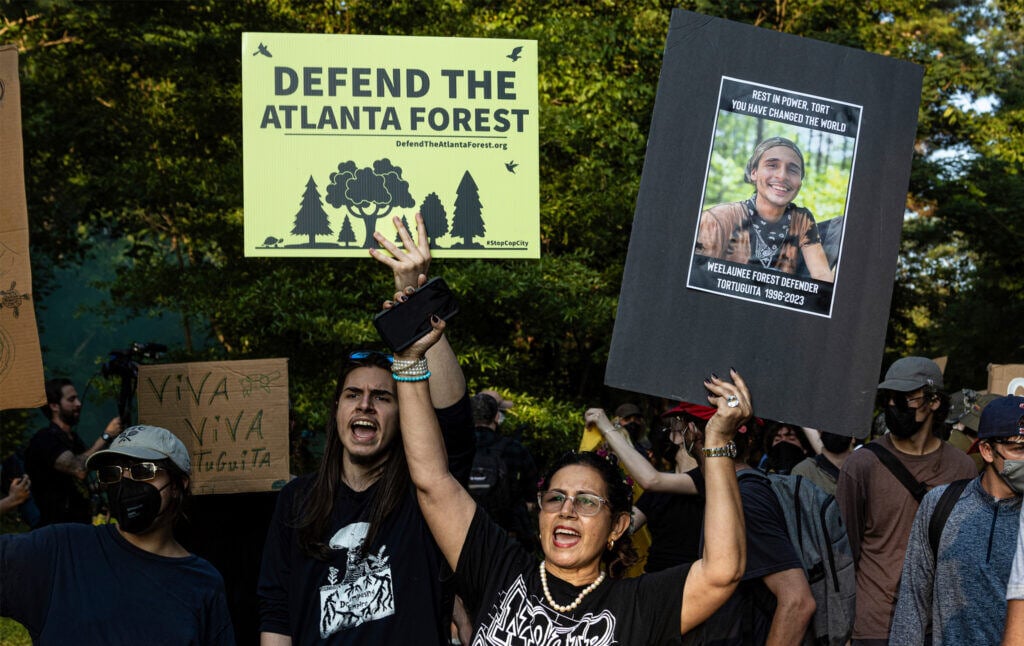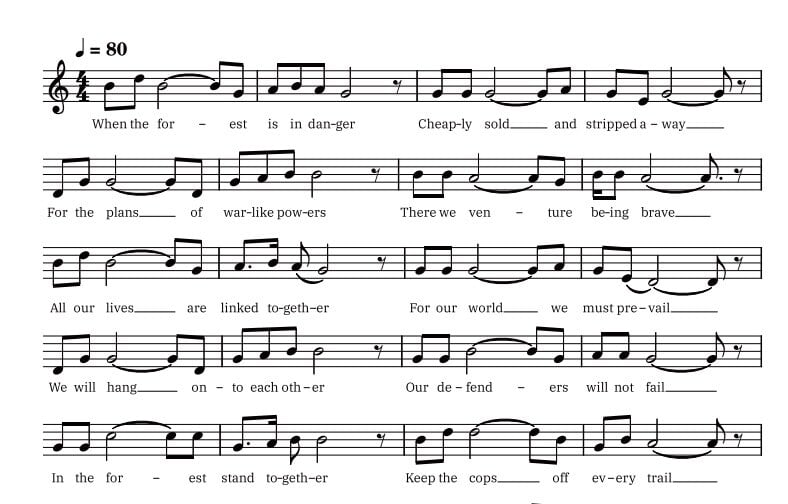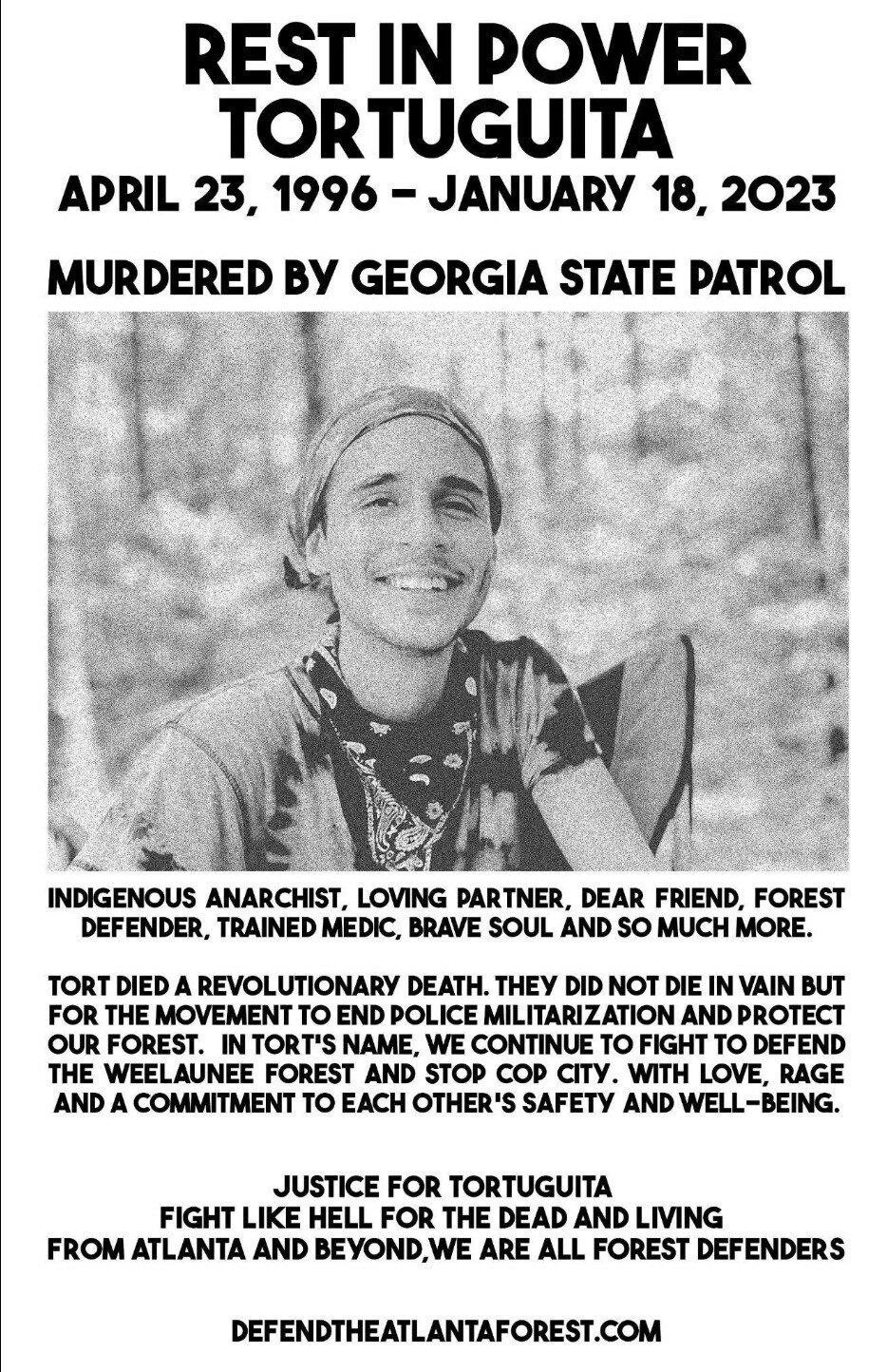
The “Cop City” Indictment Is Preposterous and Terrifying
The Georgia attorney general accuses activists of being “racketeers,” “money launderers,” and even “domestic terrorists.” This ludicrous court case should be denounced by everyone who values their freedom.
The background is this: Atlanta is trying to build America’s largest police training facility in a public forest outside the city. Since 2021, protesters have occupied the forest trying to keep the center, nicknamed “Cop City,” from being built. Cop City, according to protesters, is intended to have “military-grade training facilities, a mock city to practice urban warfare, dozens of shooting ranges, and a Black Hawk helicopter landing pad.” They expect, quite reasonably, that it “will serve as a national model of police militarization and budgetary bloat.” The “Defend the Atlanta Forest” movement is something of a ragtag band, and they both protest the development and engage in minor acts of sabotage. (They also offer an entirely charming songbook with classic songs like “We Shall Not Be Moved” and “Bella Ciao” rewritten to have lyrics about protecting forests.)

Now, an Atlanta grand jury has indicted over 60 of the protesters under the state’s Racketeer Influenced and Corrupt Organizations (RICO) Act, meaning they each face up to two decades in prison. Many of the protesters were already charged with “domestic terrorism.” The prosecutors are clearly trying to “throw the book at” the forest defenders, with the latest indictment treating them as if they’re a cross between the Mafia, ISIS, and the Earth Liberation Front.
The indictment is ludicrous, and the ACLU has condemned it in the strongest terms, calling it a “breathtakingly broad and unprecedented use of state terrorism, anti-racketeering, and money laundering laws against protesters” that “stigmatize[s] and target[s] those who disagree with the government.” It’s transparently a mis-application of the law, since nothing about the protesters’ actions in any way resembles “racketeering” (operating a business with illegally derived income). Obviously, various protesters have broken particular laws at various points (such is the nature of civil disobedience). But the new indictment lumps them all together as part of a giant conspiracy, so that even the most minor acts (such as writing the letters “ACAB”) are considered by the prosecutors to be proof of felonious criminal wrongdoing.
The 109-page indictment is absolutely full of First Amendment violations. I’ve never seen anything quite like it in my years reading legal documents. The prosecutors are quite open about treating protesters’ belief in eco-anarchism as an important part of their wrongful conduct, with their shared ideas being the “conspiracy.” It’s a chilling document, because if the standards it applies are taken seriously, practically any activist for any cause has to fear being charged as part of a criminal conspiracy. If any people in a protest movement break a law, then huge numbers of the other people in the protest movement (who did not break any laws) can still be charged as part of a “conspiracy.” The indictment really is the stuff of totalitarian states, and I would hope that the “small government” crowd on the right would be just as outraged by it as those of us on the left. (Fat chance.)
Let me just go through a few of the lowlights. First, from early on in the indictment, it’s clear that the prosecutors consider anarchism highly relevant. Under section I, “The Enterprise,” prosecutors have a whole section on the “Anarchy Background.” They give a potted explanation of anarchist philosophy that sounds like a hastily-written seventh-grade book report:

Amusingly, in describing this pernicious, subversive ideology, the prosecutors explain that anarchists believe in such radical notions as “social solidarity” and “human altruism”:

At some points, the indictment makes clear that they view the protesters’ political speech as part of the criminal conspiracy. In a section called “Propaganda and Recruitment,” prosecutors say that “Defend the Atlanta Forest uses websites, social media, and statements to traditional media to sow disinformation and propaganda to promote its extremist political agenda, legitimize its behavior, and recruit new members,” and that it “uses written anarchist pamphlets, booklets, and writings”:

Say what? They “promote their own narrative”? The indictment reads as if the prosecutors have never actually heard of the United States Constitution, and have not given any consideration to whether people have a right to speak freely on political topics without fearing prosecution. It’s very strange, actually, because one would think that if prosecutors wanted to avoid the appearance of prosecuting protesters for their political beliefs, they wouldn’t fill the indictment with long passages about the protesters’ political beliefs.
The indictment makes clear that the prosecutors object to the protesters’ “anti-police” agenda. At one point, it says that Defend the Atlanta Forest “began a propaganda campaign against police” after a police officer shot and killed one of the protesters. The protester in question, Manuel “Tortuguita” Terán, was riddled with 57 gunshot wounds, and while police claim Tortuguita shot them first, there is evidence to the contrary. Nevertheless, the indictment says that “evidence demonstrated that the Defend the Atlanta Forest member shot the trooper first,” and so treats protesters’ arguments to the contrary as a “propaganda campaign.” The indictment even cites the fact that three protesters “did distribute flyers calling Trooper Jonathan Saucedo a murderer,” which it characterizes as “an overt act in furtherance of the conspiracy.” (More on the flyering is reported at The Intercept.) Over and over in its pages, protected political speech is characterized as part of the “conspiracy.”

The indictment is poorly written, and sloppy with facts. In its first paragraph, it says that the City of Atlanta leases the forest from the Atlanta Police Foundation, when in fact the APF leases the forest from the city. Much of it is stilted and awkward, and it sometimes sounds like the writer may be new to the English language. (It says anarchists view the police as “oppressionists,” a word that exists nowhere outside the Urban Dictionary.) It feels like ChatGPT channeling J. Edgar Hoover. (“The promotion of anarchist ideas exists and is spread on the internet… Other written documents, known colloquially as ‘zines,’ promote anarchist ideas. Anarchist documents located with the Defend the Atlanta Forest group decry capitalism in any form, condemn government, and cast all law enforcement as violent murderers…These anarchist ‘zines’ have been located throughout the forested areas…in addition to other locations where anarchists are known to be.”)
It’s clear that the Georgia prosecutors think being a dirty, disrespectful anarchist is part of the crime. Consider how the indictment describes the encampment where the forest dwellers lived:
“In addition to a so-called living room, the area had a rudimentary bathroom where a toilet seat was attached to four vertical plastic poles to emulate a very basic toilet. It sat above a crude hole in the ground so that a toilet user’s waste would fall into the hole. In themes consistent with anarchy and anti-police sentiment, a painted sign titled the bathroom and toilet as ‘9/11 memorial.’”
Of what possible relevance could this be in a criminal indictment? Unless you’re trying to portray the protesters as foul and disrespectful, and their crime as “anti-police sentiment.” Is it a crime to call your forest toilet a 9/11 memorial? And if it isn’t, what’s it doing in this document? The only conceivable purpose is to create prejudice against the protesters for their politics, attitudes, and “sentiment.” Similarly, several protesters are accused of “advocating for death to civilization,” which is construed as an “overt act in furtherance of the conspiracy” and “knowingly using threats.” Or consider this passage:
“Defend the Atlanta Forest frequently uses symbols associated with anarchist movements, to include but not limited to [sic], the capital letter ‘A’ surrounded by a circle, a raised clenched fist, Antifa flags and symbols associated with anti-fascist movements, graffiti which includes these symbols, as well as ‘Defend the Atlanta Forest,’ ‘Defend the Atlanta Forest,’ [sic] ‘Stop Cop City,’ ‘Kill Cops,’ ‘All Cops are Bastards’ (ACAB), and ‘1312’—the numerical equivalent of ACAB.”
Georgia prosecutors might pause to ask themselves: if you’re indicting people who use “symbols associated with anti-fascist movements,” what does that make you?
A serious indictment would focus on listing the particular things the protesters did that violated laws, rather than going on endlessly about how they believe in weird notions like “solidarity,” use the circle-A, and have a warped sense of humor. That’s just a totally illegitimate attack on political ideas and speech.
There are more ways that the indictment brings in totally irrelevant facts in an effort to suggest the defendants are responsible for things they never did. It dates the origins of the “conspiracy” to the George Floyd protests, and has a long paragraph on how, in the midst of that uprising and discontent over the killing of Rayshard Brooks, the Wendy’s where Brooks was killed was burned to the ground. (“While the Brooks shooting was justified, it caused anti-police violence tensions to boil over,” says the indictment.) The indictment says the area was occupied by “armed Blood street gang members” for several days and that “an innocent 8-year-old would be shot and killed by armed gang members.” But nowhere does the indictment suggest that any of the people in DTF are “Blood street gang members.” It doesn’t allege that they met the people who shot an 8-year-old, let alone that they actually shot the child. The information is just there to create a nebulous association between lawlessness, “anti-police sentiment,” and the forest defenders.
Importantly, the indictment talks constantly of how the protesters are “violent” and believe in using “violence” against the police. But to prove this, it often talks about the destruction of property as “violence,” creating the misleading impression that the protesters believe in hurting people. For instance, the indictment cites a forest defender writing: “Are we more concerned about the ‘violence’ of destroying construction machinery and police property, or about the violence of capitalist exploitation, environmental devastation, and police murder?” The indictment cites this statement as proof that the anarchist forest defenders believe in violence:
“As noted by the anarchist above, the militant anarchists engage in violence to bring attention to their own political goals and their perceived government violence.” (Note the odd phrasing, “their perceived government violence,” which is characteristic of the writing style throughout.) We have written in this magazine before about why it’s a bad idea to use the word “violence” to refer to attacks on property, and why the term should be restricted to harm caused to human beings and other sentient creatures. When a capacious definition is adopted, as in this indictment, one can characterize someone as “violent” when they’re engaged in nothing more nefarious than, say, stopping a bulldozer from working properly. As a result, the indictment is full of sentences like “Violent anarchists often engage in violent activity towards law enforcement, and it is justified because of the anarchist belief that the ends justify the anarchist means,” with little specification as to what “means” we’re talking about that would allow us to assess whether what the anarchists are doing really is justified.
This is not to say that no protesters have engaged in any violent acts. Some are accused of throwing Molotov cocktails at police officers. That’s violent! But the indictment treats all 60-plus defendants as part of a violent criminal gang, even though some people are alleged only to have engaged in activities that are either (1) entirely legal or (2) mild and nonviolent. Acts described as part of the “conspiracy” include such things as “being reimbursed for food” and “buying a tarp.”

One of the reasons the indictment reads strangely is that it’s clear the prosecutors couldn’t find evidence that all the forest defenders they wanted to charge with crimes had actually committed crimes. So, instead, they got the idea that they’d use the RICO statute, which allows you to ensnare people who didn’t do anything that would be a crime on its own. Instead, it becomes a crime when it’s part of a criminal conspiracy. It’s very clear throughout the indictment that prosecutors are stretching hard to make the conduct of the forest defenders somehow fit the text of the statute. Consider the following passage:

This phrase recurs a lot throughout the indictment, “knowingly using threats against construction officials with the intent to cause and induce the construction officials to withhold records, documents, and testimony in official proceedings.” I assume there’s some special prohibition on doing anything that intimidates people into withholding testimony in official proceedings. That would explain why the indictment construes anything the protesters do to try to stop construction workers from building the police training center as an effort instead to keep the construction workers from testifying in court.

The whole indictment requires us to mentally warp certain behaviors into entirely different behaviors, so that they satisfy the restrictions of the law. Reimbursing people’s food expenses becomes “money laundering.” Disabling a piece of construction equipment becomes “domestic terrorism.” Handing out a flyer about how the cops murdered your colleague becomes “spreading disinformation.” I’m reminded of the way American right-wingers live in an alternate universe, built in their minds, where the mildest deviations from their prescribed social norms become terrifying threats to the foundations of civilization. So sing-a-long-loving eco-anarchists who live in a forest become “racketeers” and “terrorists.”
But here’s the thing: this is not just the fault of these rogue prosecutors. The prosecutors are able to construct an indictment like this because the law is flexible in allowing them to charge people as being part of a “conspiracy,” even if they didn’t do very much that was actually criminal.
We might want to reflect, then, on how “conspiracy,” if broadly construed, is not necessarily a legal concept we want to legitimize or encourage. A lot of people who can plainly see that the Cop City indictment is ludicrous were perfectly happy to see Donald Trump and his cronies indicted by the same Atlanta grand jury under the same RICO statute. I’m a little worried that because Democrats have become less critical of the FBI, and encourage harsh sentences to be handed down against Jan. 6 defendants, they do not see how frightening it is to allow prosecutors with broad powers to find “conspiracies.” Personally, I viewed Jan. 6 as a terrifying event comparable to the Beer Hall Putsch, but I also understand that you should always be careful when calling for the harsh application of a law to someone, because if it’s applied harshly to them, it might someday be applied harshly to you. What if left-wing protesters illegally occupied the Capitol building, for instance? Would we still want harsh prison sentences? It may be satisfying to watch Trump’s friends be indicted by the dozen for “racketeering,” but the next week, the very same government could (and has) indicted a bunch of eco-anarchists for “racketeering,” and all of a sudden we’ll be arguing that racketeering should be construed narrowly rather than broadly.
Personally, I think we need a consistent anti-carceral politics that is highly critical of police and prosecutors. They are not our friends, even when they are prosecuting Donald Trump for serious crimes he has definitely committed. There’s a risk that as Trump’s legal cases proceed, many on the left will be less vocal in their criticism of the criminal punishment system, because it is punishing someone we detest. But we need to remember that the Trump prosecution is atypical. More typical of prosecutorial behavior is the Cop City indictment, an outrageously unfair and harsh attempt to throw people in cages for behavior that is in many cases entirely legal, and even in the worst cases not nearly so harmful as to justify a prison sentence. (I personally believe we should be trying to entirely eliminate prison as a tool of addressing social problems.)
I am worried that the Cop City case is not going to get the attention it needs. This indictment is ridiculous. It is persecuting good people who are taking risks for a worthy cause. They are trying to save a forest and stop the militarization of police, because they care about the environment and about keeping people from being beaten, caged, and killed by police officers. They are heroic and they have good values. The people trying to cage them for years are authoritarians who not only don’t care about the lives of the victims of police brutality, but don’t even care about the importance of basic constitutional protections for political speech. This prosecution needs to be vigorously opposed by anyone who wants to live in a country where your political ideas are not a crime. If these people are sent to prison, do not be surprised when you are next. The fight for their freedom is the fight for a free country for everyone. Not only should Cop City obviously not be built, but the grotesquely unfair charges against the protesters must be dropped immediately, and those who brought them should be forced to resign in disgrace.



